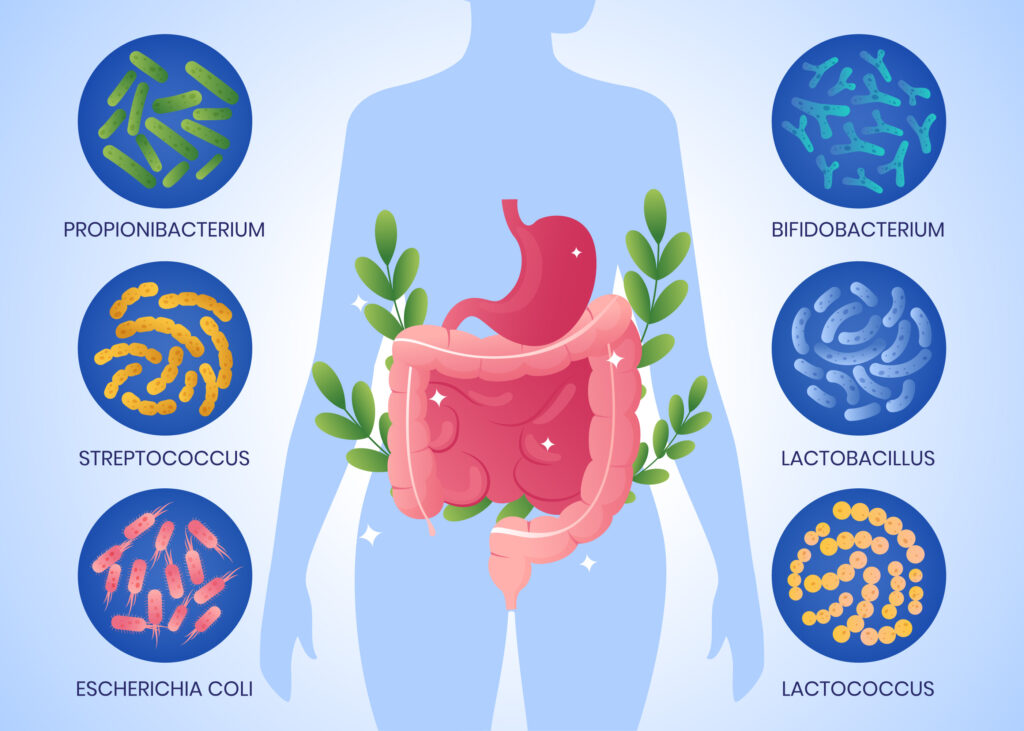The gut microbiota, the diverse community of microorganisms that resides in your gastrointestinal tract, plays a crucial role in maintaining overall health and well-being. Here are some of the key aspects highlighting the importance of healthy gut bacteria:
- Digestion and Nutrient Absorption: Gut bacteria are involved in breaking down complex carbohydrates, fiber, and other food components that are challenging for the human digestive system to process. They help in the digestion and absorption of nutrients, including vitamins and minerals.
- Immune System Support: A substantial portion of the immune system is located in the gut. Healthy gut bacteria help regulate and balance the immune response, protecting against pathogens and preventing chronic inflammation.
- Production of Short-Chain Fatty Acids (SCFAs): Gut bacteria ferment dietary fiber and produce SCFAs, such as butyrate, acetate, and propionate. SCFAs have multiple health benefits, including nourishing the gut lining, reducing inflammation, and helping to maintain a healthy gut environment.
- Metabolism and Weight Regulation: Some gut bacteria influence metabolism and energy balance. An imbalance in the gut microbiota has been associated with conditions like obesity and metabolic syndrome.
- Mood and Mental Health: The gut-brain connection is a growing area of research. Emerging evidence suggests that the gut microbiota can influence mood, behavior, and mental health conditions like anxiety and depression.
- Synthesis of Vitamins: Certain gut bacteria are involved in the synthesis of essential vitamins like B vitamins (e.g., B12 and folate), which are critical for various bodily functions.
- Protection Against Pathogens: Healthy gut bacteria can outcompete harmful pathogens, preventing infections and protecting against diseases.
- Maintenance of Gut Barrier Function: A healthy gut microbiota helps maintain the integrity of the gut lining, preventing the leakage of harmful substances into the bloodstream. This is often referred to as “leaky gut syndrome.”
- Allergy and Autoimmune Disease Regulation: Some research suggests that the gut microbiota can influence the development and progression of allergies and autoimmune diseases.
- Detoxification: Certain gut bacteria can assist in the detoxification of harmful substances in the gut.
- Prevention of Inflammatory Bowel Diseases (IBD): A balanced gut microbiota is thought to play a role in preventing conditions like Crohn’s disease and ulcerative colitis.
- Enhanced Nutrient Production: Some gut bacteria can transform certain substances in food into beneficial compounds, such as phytonutrients.
- Drug Metabolism: Gut bacteria can influence how medications are metabolized, which can impact their effectiveness and side effects.
It’s essential to maintain a balanced and diverse gut microbiota through a healthy diet rich in fiber, probiotics, and prebiotics, as well as through lifestyle factors like regular exercise and stress management. Imbalances in the gut microbiota (dysbiosis) have been associated with a wide range of health problems, including gastrointestinal disorders, metabolic conditions, and even some neurological disorders. Therefore, promoting a healthy gut microbiota is critical for overall health and disease prevention.

The human gut is home to a vast and diverse community of bacteria, collectively known as the gut microbiota. While it’s challenging to definitively identify the single most important gut bacteria, there are several key bacterial species and genera that play significant roles in maintaining gut health and influencing overall well-being. These include:
- Bacteroides: Bacteroides are a dominant group of bacteria in the human gut and are involved in breaking down complex carbohydrates and fermenting them into short-chain fatty acids (SCFAs), which provide energy and have various health benefits.
- Firmicutes: Firmicutes are another major group of bacteria in the gut and are involved in the digestion of dietary fiber, producing butyrate (a type of SCFA) that supports gut health.
- Escherichia coli: E. coli is a diverse group of bacteria, some of which are beneficial and essential for the synthesis of certain vitamins and competing with pathogenic strains for resources.
- Bifidobacterium: These are known as beneficial or “friendly” bacteria and are important for the fermentation of fiber and producing lactic acid, which helps maintain a balanced gut environment.
- Lactobacillus: Lactobacillus bacteria are commonly found in fermented foods and supplements and are known for their role in promoting gut health, improving digestion, and supporting the immune system.
- Akkermansia muciniphila: This bacterium is associated with a healthy gut and is known for its ability to break down mucin, a protective layer in the gut, and stimulate the production of mucus.
- Faecalibacterium prausnitzii: This bacterium is one of the most abundant species in the colon and plays a role in the production of butyrate, which is crucial for gut health.
It’s important to note that the composition of the gut microbiota can vary greatly among individuals and can be influenced by diet, lifestyle, genetics, and various environmental factors. A diverse and balanced gut microbiota is generally considered essential for overall health, as it helps with digestion, nutrient absorption, and supports the immune system. However, the importance of specific bacterial species may vary based on individual circumstances and health conditions.
In recent years, research into the gut microbiota and its role in human health has expanded significantly, and scientists are continually discovering more about the complex interactions and functions of various gut bacteria. Therefore, our understanding of the most important gut bacteria may continue to evolve as new research emerges.



